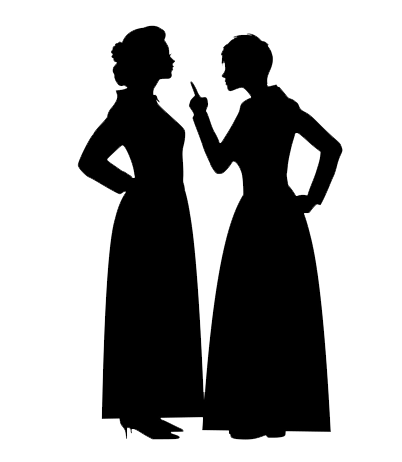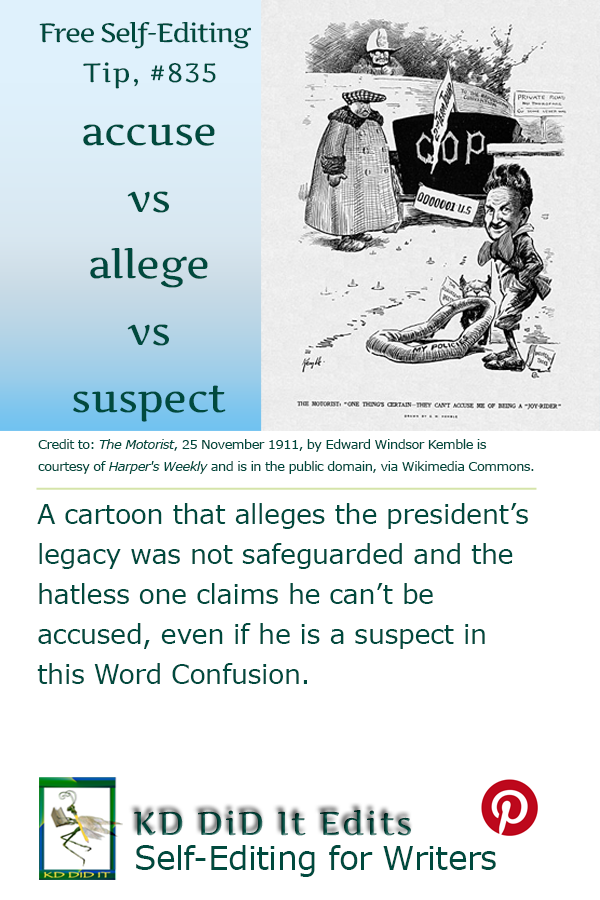Revised as of
18 Oct 2022
Both accuse and allege claim that someone has done something wrong. The difference between them is how strongly that claim is made.
Accuse is the stronger of the two and implies there is proof while allege believes but has no proof. It’s one reason alleged is used so frequently before a court case occurs. It also keeps down the number of lawsuits . . .
The person allegedly accused is the suspect, or someone who is suspected of doing wrong . . .
You may also want to explore the post “Accuse versus Charge” and/or “Allege versus Assert“.
Word Confusions . . .
. . . started as my way of dealing with a professional frustration with properly spelled words that were out of context in manuscripts I was editing as well as books I was reviewing. It evolved into a sharing of information with y’all. I’m hoping you’ll share with us words that have been a bête noire for you from either end.
If you found this post on “Accuse vs Allege vs Suspect” interesting, consider tweeting it to your friends. Subscribe to KD Did It, if you’d like to track this post for future updates.
| Accuse | Allege | Suspect |
|---|---|---|

Angry Women by Mohamed Hassan is under the CC0 license, via PxHere, <https://pxhere.com/en/photo/1447339>. — Looks like she’s accusing the other lady . . . |

New York Mirror Front Page of August 6, 1962 is courtesy of the New York Daily Mirror and is in the public domain, via Wikimedia Commons. — Conspiracy theorists allege that Monroe was murdered. |

Sketch of the East Area Rapist Suspect is courtesy of the FBI and is in the public domain, via Wikimedia Commons. |
| Part of Grammar: | ||
| Verb, intransitive & transitive
Third person present verb: accuses |
Reporting verb
Third person present verb: alleges |
Adjective; Noun; Verb, intransitive & transitive Plural for the noun: suspects Third person present verb: suspects |
| Verb, intransitive: To make an accusation To charge with a shortcoming or error To charge formally with a wrongdoing Verb, transitive:
|
Claim or assert that someone has done something illegal or wrong, typically without proof that this is the case
To declare with positiveness
To declare before a court or elsewhere, as if under oath To plead in support of
[Archaic] To cite or quote in confirmation |
Adjective: Not to be relied on or trusted
Noun: Verb, intransitive:
Verb, transitive:
Doubt the genuineness or truth of To believe to be the case or to be likely or probable
To have some hint or foreknowledge of |
| Examples: | ||
| Verb, intransitive: “It is conceivable that the Court has overstepped its boundaries as the dissenting Justices accuse” (Garner, 17). “The teams stand accused, essentially, of refusing to grant plaintiffs cablecast rights in furtherance of a conspiracy with Cablevision to monopolize cable television trade in Huntington” (Garner, 16). Verb, transitive: He was accused of favoritism. She accused him of murdering her husband. He accused her of spying on him. |
He alleged that he had been assaulted.
He is alleged to have assaulted five men. The offenses are alleged to have been committed outside the woman’s home. It was the first artifact ever alleged to be from Earhart’s aircraft. The first charge is quite clear, and I advise the Court that the particulars in that charge allege or constitute a war crime. The applicants allege that there is insufficient evidence to show that a charge of forgery could be laid. In 1984, the U.S. Supreme Court established a three-part “effects” test to determine personal jurisdiction where a suit alleges the commission of an intentional tort. |
Adjective: A suspect package was found on the platform. I can’t understand why my reasons seem suspect to a number of people. You should know how to deal with suspect packages. Noun: They are suspects in a bank robbery. The second suspect was apprehended an hour ago. Verb, intransitive: He knew not what to suspect. It is true that he suspects. Verb, transitive: She suspected that he might be bluffing. The parents were suspected of child abuse. I suspect his knowledge did not amount to much. I think she suspected the surprise. |
| Derivatives: | ||
| Adjective: accusable, accusatorial, accusatory Adverb: accusably, accusingly Noun: accusant, accusation, accused, the accused (the plural), accusement, accuser, accusing |
Adjective: allegeable, alleged Adverb: allegedly Noun: allegation, alleger, alleging Verb: misallege, misalleged, misalleging, preallege, prealleged, prealleging |
Adjective: nonsuspect, suspected, suspectible, suspectless, unsuspecting Noun: nonsuspect, suspecter Verb: presuspect |
| History of the Word: | ||
| Middle English from the Old French acuser, from the Latin accusare meaning call to account, from ad- (towards) + causa (reason, motive, lawsuit). | Middle English, in the sense declare on oath, is from the Old French esligier, which is based on the Latin lis, lit- meaning lawsuit. It can be confused in sense with the Latin allegare meaning allege. | Middle English (originally as an adjective) from the Latin suspectus meaning mistrusted, past participle of suspicere, from sub- (from below) + specere (to look). |
C’mon, get it out of your system, bitch, whine, moan . . . which words are your pet peeves? Also, please note that I try to be as accurate as I can, but mistakes happen or I miss something. Email me if you find errors, so I can fix them . . . and we’ll all benefit!
Satisfy your curiosity about other Word Confusions on its homepage or more generally explore the index of self-editing posts. You may also want to explore Book Layout & Formatting Ideas, Formatting Tips, Grammar Explanations, Linguistics, Publishing Tips, the Properly Punctuated, Writing Ideas and Resources, and Working Your Website.
Resources for Accuse vs Allege vs Suspect
Apple Dictionary.com
Dictionary.com: allege, suspect
Garner, Bryan A. A Dictionary of Modern Legal Usage. Ed. 2. Oxford University Press, 1995.
Lexico.com: allege
Pinterest Photo Credits:
The Motorist, 25 November 1911, by Edward Windsor Kemble is courtesy of Harper's Weekly and is in the public domain, via Wikimedia Commons.


